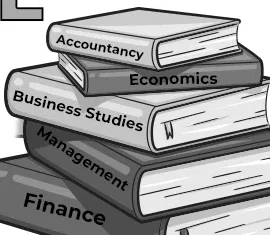Introduction
The CBSE Class 12 Board Exams are one of the most important milestones for commerce students. Subjects like Accountancy, Business Studies, and Economics demand not just conceptual clarity but also excellent answer-writing skills. This article is tailored for the CBSE 2025 exams, focusing on the latest syllabus and question patterns. For Economics, this guide emphasizes Macroeconomics and Indian Economic Development, helping you craft answers that align with CBSE expectations.
Let’s dive into strategies to master these subjects and score your best!
Chapter 1: Mastering Accountancy Answers
1.1 CBSE 2025 Accountancy Exam Pattern
The Accountancy paper is divided into two parts:
1. Part A: Financial Accounting (Partnership Firms, Company Accounts).
2. Part B: Analysis of Financial Statements or Computerized Accounting.
1.2 Tips for Theory Questions
• Use definitions straight from NCERT or T.S. Grewal.
• Support your answers with examples (e.g., reserves, provisions, or capital reserves).
1.3 Tips for Numerical Questions
1. Master Formats:
• Learn formats for journal entries, ledger accounts, and financial statements (e.g., balance sheet and cash flow statement).
2. Show All Steps Clearly:
• For complex problems like goodwill valuation or profit-sharing adjustments, include working notes for better clarity.
3. Recheck Calculations:
• Verify totals, cross-check figures, and ensure that the debit and credit sides match in the balance sheet.
1.4 Important Topics for 2025 Board Exam
• Partnership: Admission, Retirement, and Dissolution.
• Company Accounts: Issue and Forfeiture of Shares, Debentures.
• Cash Flow Statements and Ratio Analysis.
1.5 Time Management
• Allocate 85% of your time to practical questions and 10% to theory.
• Attempt high-mark questions first to maximize your score.
Chapter 2: Excelling in Business Studies Answers
2.1 CBSE 2025 Business Studies Exam Pattern
The paper includes three sections:
• Section A (1 Mark): MCQs and very short answers.
• Section B (3–4 Marks): Application-based and short answers.
• Section C (6 Marks): Long answers and case studies.
2.2 How to Answer Different Types of Questions
1. 1-Mark Questions:
• Write concise and to-the-point answers. Example: Define “coordination” as “the essence of management.”
2. 3–4 Mark Questions:
• Use bullet points and examples for clarity. Example: Explain the “principles of management” using Fayol’s principles.
3. 6-Mark Questions:
• Write structured answers with an introduction, body, and conclusion.
2.3 Solving Case Studies
1. Step 1: Read the case study twice and underline key points.
2. Step 2: Identify the topic (e.g., staffing, marketing mix, or consumer protection).
3. Step 3: Frame the answer:
• State the problem.
• Apply the concept/theory.
• Conclude with the solution.
2.4 Presentation Tips
• Highlight key points using headings and subheadings.
• Draw flowcharts or diagrams wherever possible (e.g., organizational structure or decision-making process).
2.5 Important Topics for 2025 Board Exam
• Planning, Organizing, and Staffing.
• Principles of Management (Fayol and Taylor).
• Marketing and Consumer Protection.
Chapter 3: Writing Effective Economics Answers
3.1 CBSE 2025 Economics Exam Pattern
The Economics paper has two sections:
1. Macroeconomics: Focuses on topics like national income, monetary policy, and aggregate demand/supply.
2. Indian Economic Development: Includes chapters on India’s development experience, poverty, rural development, and more.
3.2 How to Tackle Macroeconomics Questions
1. Theory-Based Questions:
• For 1–2 Mark Questions: Write concise definitions. For example, define “national income” as “the total value of all goods and services produced within an economy in a given time period.”
• For 4–6 Mark Questions:
• Begin with a definition or introduction.
• Add an explanation with examples.
• Include diagrams (e.g., AD-AS curve) with proper labeling.
2. Numerical Questions:
• Use clear steps for calculations. Example: For calculating National Income, write formulas like
NI = C + I + G + (X – M) before solving.
• Explain each step briefly to show your understanding.
3. Diagram Presentation:
• Draw neat graphs like Aggregate Demand/Supply curves or IS-LM models.
• Label diagrams properly and include a short explanation.
3.3 How to Tackle Indian Economic Development Questions
1. Theory-Based Questions:
• Write structured answers with facts and examples. For example, in a question on “Poverty,” include types (absolute and relative) and government initiatives like MNREGA.
2. Data-Based Questions:
• Interpret tables, graphs, or trends given in the question.
• Use real-life examples or statistics (e.g., India’s literacy rate or GDP growth).
3. Answer Structure:
• Introduction: Define the concept.
• Body: Provide a detailed explanation with examples or data.
• Conclusion: Suggest improvements or summarize key points.
3.4 Important Topics for 2025 Board Exam
• Macroeconomics: National Income, Government Budget, Aggregate Demand/Supply, and Money and Banking.
• Indian Economic Development:
• India’s Development Experience (1947–1990).
• Economic Reforms of 1991.
• Poverty, Rural Development, and Human Capital Formation.
Chapter 4: General Exam Tips for CBSE 2025
4.1 How to Use Reading Time
• Spend the first 15 minutes reading the question paper.
• Mark the easiest questions to attempt first.
4.2 Answer Writing Tips
• Underline important points and keywords.
• Use proper margins and avoid overwriting.
• Write in points or paragraphs based on the marks assigned.
4.3 Time Management
• Divide your time wisely:
• 1-Mark Questions: 10–15 minutes.
• 3–4 Mark Questions: 50 minutes.
• 6-Mark Questions: 1 hour.
• Revision: 10–15 minutes.
4.4 Focus on High-Weightage Chapters
Prioritize chapters based on weightage in the syllabus:
• Accountancy: Partnership, Company Accounts.
• Business Studies: Principles of Management, Marketing.
• Economics: National Income, Economic Reforms of 1991, Poverty.
4.5 Practice Regularly
• Solve at least one full sample paper weekly.
• Practice diagrams and numerical problems daily.
Chapter 5: Additional Resources for Success
5.1 Recommended Books
• NCERT Textbooks for all subjects.
• Accountancy: T.S. Grewal.
• Business Studies: Poonam Gandhi.
• Economics: Sandeep Garg (Macroeconomics and Indian Economic Development).
5.2 Online Resources
• CBSE sample papers and marking schemes.
• Video tutorials for difficult topics like AD-AS diagrams or Cash Flow Statements.
5.3 Study Groups and Peer Learning
• Discuss key topics with friends to deepen your understanding.
• Test each other using case studies and numericals.
Conclusion
The CBSE 2025 exams for Class 12 commerce students are an opportunity to showcase your hard work and preparation. With focused study, regular practice, and smart answer-writing techniques, you can excel in Accountancy, Business Studies, and Economics.
Use this guide to structure your answers, manage your time effectively, and stay confident. Wishing you the best of luck for your board exams!

